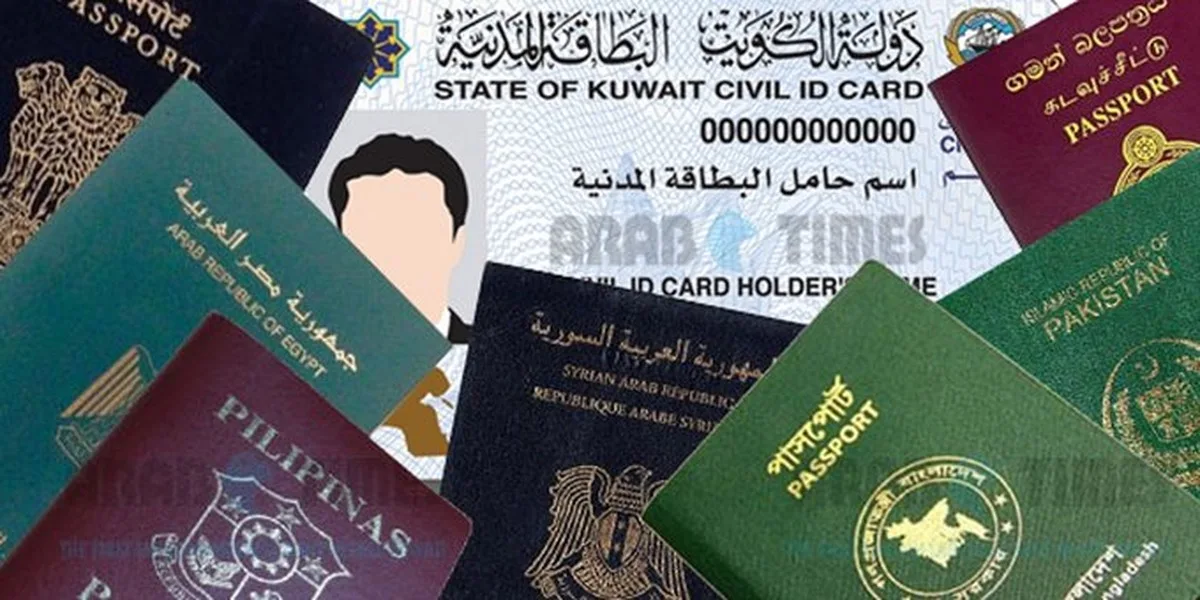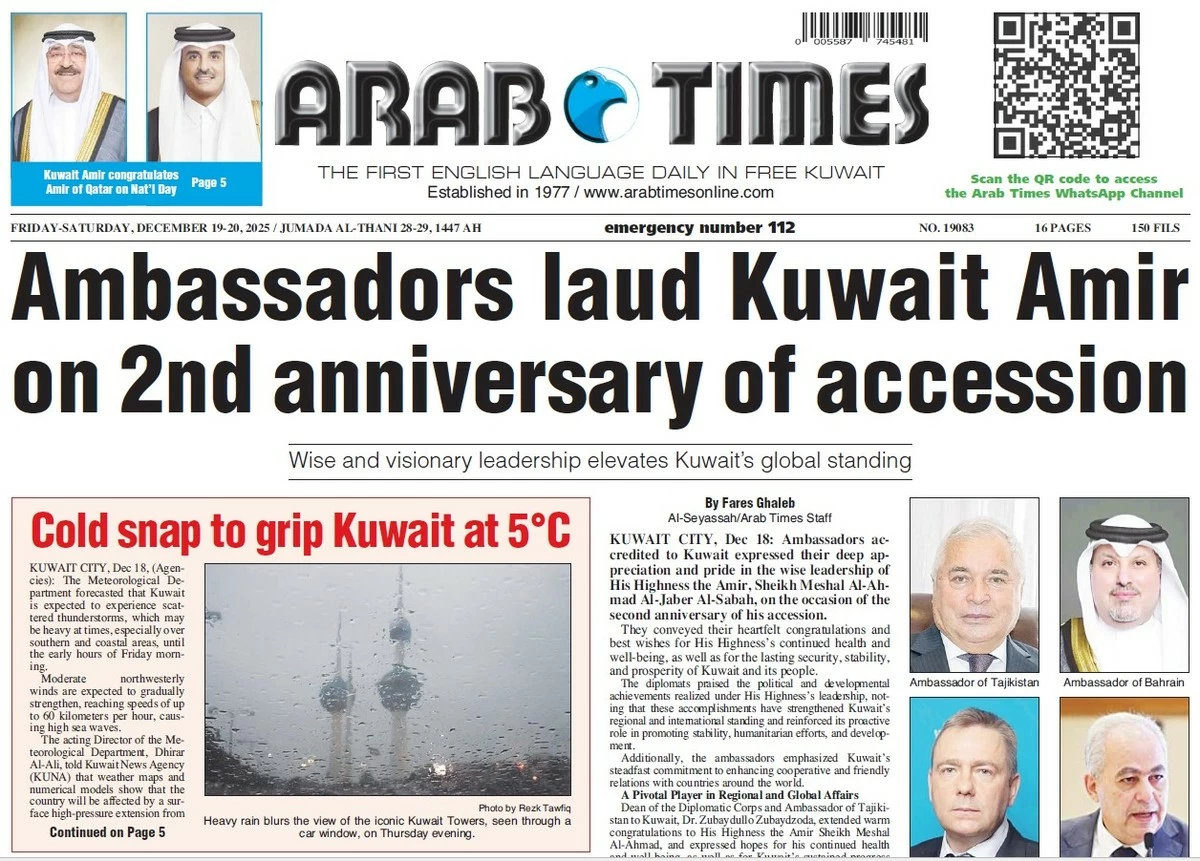12/12/2024
12/12/2024

KUWAIT CITY, Dec 12: Assistant Undersecretary for Residency and Citizenship Affairs at the Ministry of Interior Major General Ali Al-Adwani says the new foreign residency law was introduced to keep pace with evolving developments and changes, especially since the previous law had been in effect for over six decades without any major amendments other than a few articles. In an interview with the “60 Minutes Program”, he highlighted the main provisions of the new law, including changes to the residency periods for certain groups, such as the children of Kuwaiti women, as the law now grants them a ten-year residency.
Major General Al-Adwani explained that the residency of children of Kuwaiti women can be renewed for a similar period, with exemption from fees, provided they have not obtained Kuwaiti citizenship under Article 8 of the Nationality Law. The law also exempts these children from losing their residency if they are outside the country for more than six months for medical treatment or educational purposes. He highlighted the instructions from senior leadership to open the country and facilitate processes for everyone but stressed that there must be accountability. Major General Al-Adwani explained that there have been no violations since the introduction of the family visit visa in March, except for four cases in which individuals and their sponsors were deported. The duration of the family visa has been extended to three months, and the concerned minister now has the authority to amend and determine the fees.
The new foreign residency law, issued by an Amiri decree on November 28, aims to address the shortcomings and loopholes of the previous law. The law provides justice to migrant workers, combats visa trading by tightening penalties regulates the relationship between employees and employers, and specifies the rights and obligations of both parties.
The law, which is set to be implemented within six months from its publication in the official gazette, comprises 36 articles in seven chapters. It includes amendments and updates to several articles that serve the interests of both citizens and residents. Kuwait is not isolated from the global community, and there are international organizations that monitor the handling of human trafficking issues. From this perspective, some provisions of the new law were created to align and comply with international standards.
The new residency law allows foreigners to obtain regular residence in Kuwait for a period not exceeding five years. The law also introduces new incentives and privileges for foreign investors. Property owners in Kuwait are entitled to a ten-year residence, as determined by a decision issued by the Council of Ministers. Foreign investors can be granted a 15-year residence to encourage investment. Also, the duration of the family visit visa has been extended to three months. Major General Al-Adwani indicated that Article 17 of the new law stipulates that all fees related to residency, renewals, and entry visas will be determined by a decision from the Minister of Interior. He explained that the First Deputy Prime Minister, Minister of Defense, and Minister of Interior Sheikh Fahad Yousef Saud Al-Sabah has directed the formation of a committee to study the fees to ensure they are consistent with residents’ incomes and the type of service provided.
He said it is unreasonable for a Kuwaiti citizen to pay KD 70 or KD 80 to enter certain countries, while citizens of those countries are not required to pay any fees upon entering Kuwait. Major General Al-Adwani explained that the law imposes severe penalties on those who facilitate the recruitment of expatriates. It specifically prohibits visa trading by exploiting recruitment or facilitating entry visas, residence permits, or renewals in exchange for financial sums or benefits. This applies irrespective of whether the recruitment or renewal is for real, fictitious, or alleged employment, or if it is for employing expatriates for the recruiters themselves or for others without a license or in violation of the provisions of the labor law in the private sector or the domestic labor law.
The law also prohibits employers or recruiters from employing expatriates for purposes other than their original recruitment or from enabling or facilitating their work for others without a license from the Ministry of Interior. It also forbids employers from refusing to pay an expatriate’s dues without justification. Moreover, the law prohibits expatriates from working for others without the permission of their government employer or the competent authorities. It is also illegal for anyone to shelter or employ an expatriate, irrespective of whether their residency is valid or expired, or to house them if they do not have valid residency in the country.
The law stipulates the cancellation of the license of any company that brings in a foreign worker. Any official, if proven to be involved in residency trafficking or have employed a foreigner for purposes other than their original recruitment, will face imprisonment for between three years and five years, and/or a fine ranging from KD 5,000 to KD 10,000. The fine is multiplied by the number of violating expatriates, and the penalty is doubled if the offender is a public employee acting within the scope of their job. In the case of repeat offenses, the penalty will be doubled.
Anyone who obtains a work permit in exchange for money, a benefit, or a promise of either will face imprisonment for up to one year and/or a fine not exceeding KD 1,000. The Minister of Interior has the authority to deport a foreigner, even if they hold a valid residence permit, if they do not have a legitimate source of income, violates Article 19, which prohibits the employer from using them for purposes other than their original recruitment, or if the minister deems their deportation necessary for the public interest, public security, or public morals.
A new domestic worker can now be brought in after four months, instead of six months, after leaving the country. Previously, the sponsor was not allowed to cancel the worker’s residency until after six months. Major General Al-Adwani stressed the importance of requiring the sponsor to prove payment of the domestic worker’s salary and other dues to ensure the protection of both parties’ rights. He revealed the ongoing updates to the Kuwait Visa website, which will significantly enhance the process of issuing all types of visas online, under the established conditions. Major General Al-Adwani highlighted the government’s commitment to digitally transform all services related to residency affairs. He highlighted the inclusion of strict legal penalties in the new residency law to reduce violations. Major General Al-Adwani urged all citizens and residents to adhere to the law to avoid legal repercussions.
By Munif Naif
Al-Seyassah/Arab Times Staff


